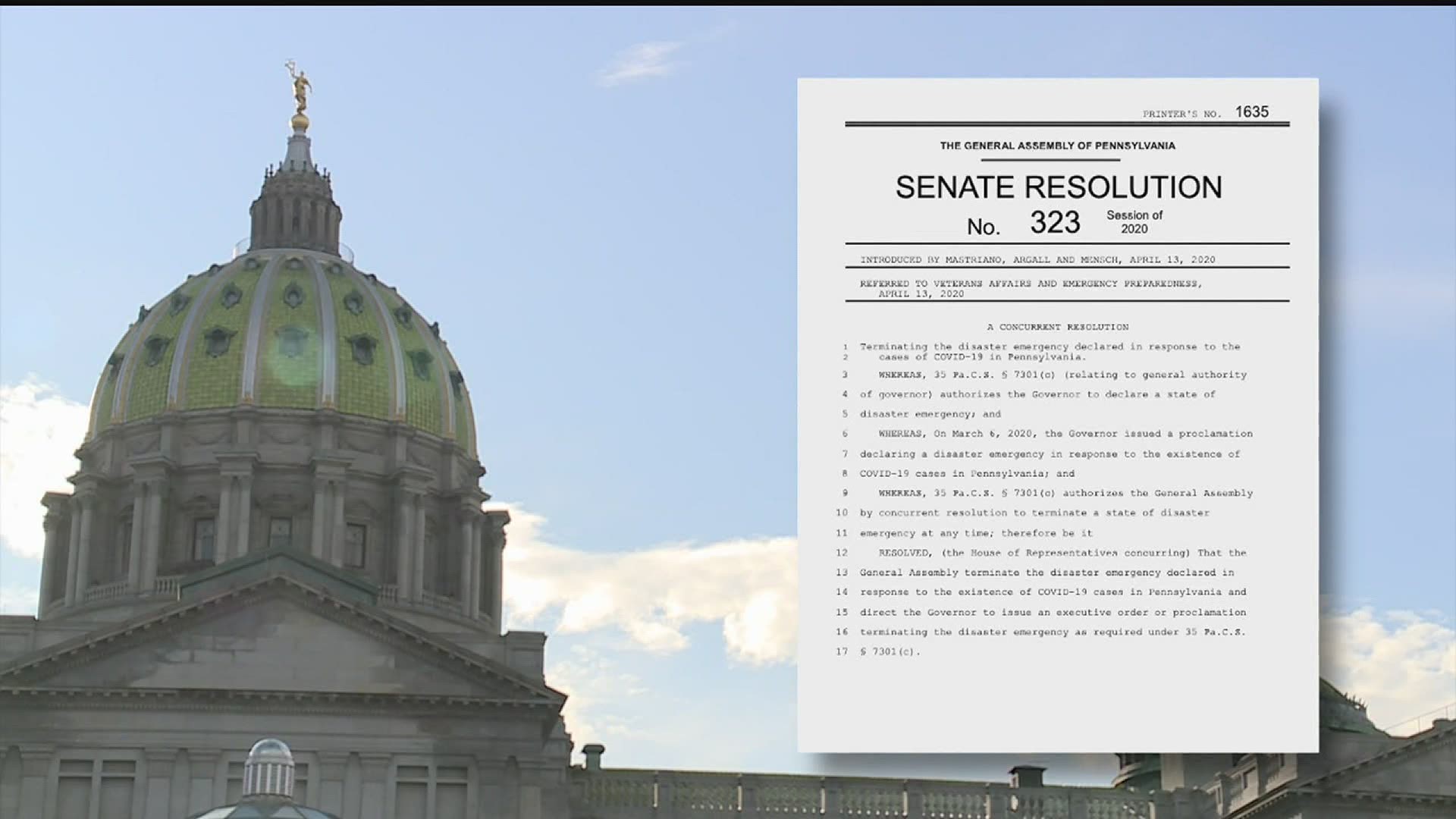HARRISBURG, Pa. — UPDATE (7/8) - House Resolution 836 has been sent to Governor Wolf.
On July 1, the State Supreme Court ruled that the resolution ending the emergency declaration had to be approved by Governor Wolf to take effect.
The PA Senate GOP says the HR 836 has been sent to the Governors desk for approval.
(6/9 - 10:30 p.m.) - The State House and Senate pass House Resolution 836, that would end Governor Wolfs shutdown order and disaster declaration.
HR 836 passed the Senate 31 -19 and in the House in a 121-81 vote. It was signed in the House on Tuesday.
House republicans say "Under the Pennsylvania Constitution, the General Assembly has the authority to terminate a state of disaster emergency at any time by concurrent resolution. Upon adoption of the resolution, the governor must issue an executive order or proclamation ending the state of disaster emergency.."
Governor Wolf has said that he will disapprove the resolution and that it is within his powers to do so.
The State House would need a 2/3 majority vote to override the Governors disapproval.
(5/28 - 10:53 p.m.): House Resolution 836 was adopted in the House 117-85.
An amendment to House Resolution 836 leaves in place the state’s emergency declaration and ensures nursing homes and long-term care facilities get the added assistance needed.
The resolution would end the executive order to shut down businesses, which Wolf issued on March 17.
It now heads to the Senate for consideration.
PREVIOUSLY REPORTED:
There are two resolutions moving through the state house in their respective senate and house chambers. Both resolutions would do the same thing, terminate the COVID-19 emergency disaster declaration issued by Governor Wolf on March 6th.
Republicans, State Rep. Russ Diamond, and State Sen. Doug Mastriano, are sponsors of the resolutions. Pennsylvania's Emergency Management Services Code defines the Governor's authority to declare a disaster emergency but, the general assembly by concurrent resolution may terminate a state of disaster emergency at any time. Governor Wolf says, he has the power to disapprove the resolution and intends to exercise that power if it does pass with a majority vote.
"I don't see by a constitutional democratic perspective why this would make any sense," said Gov. Wolf. "I do have the power to disapprove and I intend to."
Sen. Mastriano says, the resolutions would need a two-thirds majority to override Governor Wolf's disapproval and get the resolution to take effect. Assuming all republicans vote in favor of the resolution, 26 democrats in the house, and six democrats in the senate would need to support it.
"It takes the unilateral power out of the governor's hand and places it back in the hands of the general assembly," said Sen. Mastriano. By terminating the declaration, it would get rid of the red, yellow and green phases, and allow Pennsylvanians to make their own decisions on what they feel comfortable doing. "The goal is we take the power out of the governor's hands and put it back in the people's hand so they can decide if they want to open up and how to open up and if they do it safely or just go back to normal operations."
Governor Wolf says, by ending the emergency disaster declaration, the state would lose $1.5 billion dollars in FEMA funding. However, Sen. Mastriano says, the Trump Administration has assured him, the state would not lose that money if these resolutions took effect.
The emergency disaster declaration is set to expire June 4th. Within his powers as Governor, Wolf can either let it expire or extend it. The governor does intend to renew the emergency disaster declaration. His office tells FOX43:
"The governor’s COVID-19 proclamation not only allows the commonwealth to more quickly procure much-needed resources to assist county emergency management and support our medical professionals and first responders, it makes us eligible for federal reimbursement for associated costs under FEMA’s Public Assistance Program. We are still very much in need of federal funding in order to respond to and recover from this pandemic."

